Montclair Hosts Aphasia Book Club
Speech language pathology team creates safe space for reading, connection for those with disorder
Posted in: Education, Graduate School, Health, Homepage News, University
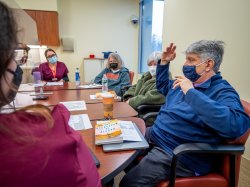
Editor’s Note: Pseudonyms are being used in this article to protect book club participants’ privacy.
Dave loves books. He spent 30 years as a high-level executive editor at a preeminent New York publishing house but aphasia, resulting from the first of multiple strokes, brought his career – and his ability to read – to an abrupt end.
“Seven years ago was my first (stroke)…then a year ago, I had two and three,” he says. With hard work and lots of therapy, Dave is reading again, albeit slowly. Once a week, he travels from his home in Little Falls to Montclair State University’s Department of Communication Sciences and Disorders clinic in Bloomfield to participate in the Aphasia Book Club. As the name implies, the majority of those in the club have aphasia or, as member Amelia puts it, a “language problem,” that can be brought on by strokes, head injuries, brain tumors or infections.
Today, the group, which also includes Kim, who had a stroke in 2013, is discussing its current book selection: The Beekeeper of Aleppo, a novel by Christy Lefteri about a couple’s journey to Britain to escape war in their native Syria.
Dave, the editor whose job was to edit and greenlight books for publishing, struggles. Words such as “chapter” or “book” and his book club friends’ names sometimes elude him but he actively participates. Instead, he points to his book, pages and people.
“Do…women…who…are…Muslim…wear…high-jabs (hijabs),” he asks haltingly about the book’s protagonist. “Their…whole…life? So…does…Afra…wear…a…high-jab?”

Dave’s sometimes-faltering speech and simple sentence structure represent huge milestones in his speech-language recovery. As the book club meeting progresses, so, too, does his communication. “It’s just like Bruce Willis,” he says at one point.
He and other book club members speculate as to what may have caused the actor’s aphasia. Like most people outside Willis’ circle, they don’t know what led to the action-movie star’s aphasia and resulting retirement, however, they are intimately familiar with the speech-language disorder.
Most book club members are also clients of the Center, receiving individual or group therapy from Montclair speech language pathology students, who are supervised by licensed speech language pathology therapists.
“I couldn’t speak,” says Amelia, a former geography teacher who had a stroke in 2010. Rather than attempt to call the Montclair facility, she found it easier to drive herself from her home in Lyndhurst to the clinic, where “they took me right in.”
After years of treatment and working with speech language pathologists, Dave, Kim and Amelia have regained their voices – and their affinity for reading.
“Reading for these particular clients is a skill that they loved and have lost or they struggle with,” explains Montclair’s Clinical Supervisor Diane Polledri. The book club “was specifically designed to provide an opportunity for clients who wanted to read but because of a brain injury were unable to do so or had difficulty reading again. It truly is a means of providing that outlet, improving quality of life, and providing an opportunity to engage in communication at a conversational level about topics of interest.”
Montclair’s book club is modeled after the Aphasia Center of California’s Book Connection™ Aphasia Book Club, which was started in 1999 after learning from clients that “their inability to ‘read a good book’ is one of the greatest losses following their brain injury or stroke.” Research has shown that book clubs can provide a support system that counters decreased socialization and reading ability that is common with aphasia.
Aphasia and the Bruce Willis announcement
Although more than 2 million people in the U.S. are affected by aphasia – more than muscular dystrophy or multiple sclerosis, according to the Aphasia Center of California – few people were aware of it until recent news that Bruce Willis (who studied drama at Montclair and received an honorary Doctor of Letters in 1996) is “stepping away” from acting. The Center describes aphasia as a medical term which refers to the “loss or reduction of language – speaking, understanding, reading, and/or writing – following brain damage, typically as a result of a stroke.”
Willis’ revelation thrust aphasia into the spotlight, which another high-profile individual with the disorder says, “We don’t talk enough about.”
“But we should,” former congresswoman Gabrielle “Gabby” Giffords recently wrote in an op-ed in The Washington Post titled “Aphasia makes it hard for me to speak. But I have not lost my voice.”
Giffords, who survived a 2011 assassination attempt that left her with a shattered skull and other injuries, writes: “People who communicate differently don’t want to be made to feel like burdens or outcasts. We’re seeking – and we deserve – the same level of human connection as everyone else.”
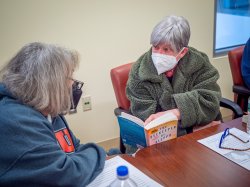
Aphasia Book Club, emphasis on “club”
Amelia and Kim have participated in the book club since its inception in 2017, while Dave, who has been attending for several years, is a newer member. They are a tight-knit group of once voracious readers who meet on Tuesday mornings for book club discussions and socializing.
Members choose the book they want to read from a list of five titles from various genres, including nonfiction, fiction, mystery, and a biography or memoir, provided to them by Polledri.
“There have been some very good books…some terrible books,” says Kim, prompting laughs. “It was more the company of the people that made me feel comfortable among them.”
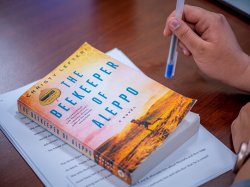
The book has provided some heavy reading for the group, which has drawn comparisons between the Syrian war in Lefteri’s book to the current war and atrocities in Ukraine. Amelia suggests the group may want to “read a comedy” as their next book selection.
Montclair speech language pathology graduate students Lauren McArthur and Jessica Russo, both 23 and graduating in May, supervise the book club meetings. The students assign the reading, usually one or two chapters per week, depending on length. They try to avoid assigning more than 50 pages at a time because members read at varying levels. The goal is to finish reading a book within an 11-week session; book club meetings run concurrently with the University’s semesters.
To encourage discussion among members, who can also participate virtually, the students write a quote or phrase on the whiteboard. By facilitating discussion, McArthur and Russo “are really targeting the ability for these clients to communicate at a very high level of communication,” Polledri says.
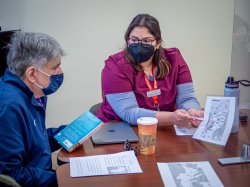
For those like Dave who require more visual aids, they also provide maps, and they compile a chapter summary, which is distributed prior to and at the meeting. The latter because “clients will complain about forgetting what they read,” Polledri explains. “This allows them to have the summary to refer to and have discussions.”
Says McArthur: “For the book club, the emphasis is really on the social aspect. It’s really allowing them the safe space to engage with their friends, read the book, and just provide them the support to do that. It’s an incredibly important aspect because it has to do with their quality of life.”
The sessions are not “super regimented,” she says. “We veer off a lot, especially for current events that may be relevant to the book. We have been talking about Ukraine a ton because of its parallels to the book.”
Typically, speech language pathology students get clinical hours for the book club assignment but McArthur and Russo are volunteers because they have already completed their three semesters of clinical hours, says Speech Language Pathology Clinic Director Katherine Papas. They volunteered because they wanted experience working with groups and adults.
“One of our close friends also facilitated this book club last semester, and she told me about how great it was, so I jumped at the opportunity,” says Russo, adding that she emailed Papas and practically begged to lead the book club.
McArthur says once she’s licensed as a speech therapist, she wants to work with adults. “I’d love to work in a hospital or rehab.”
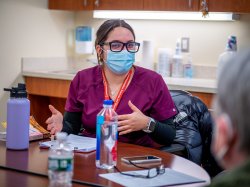
Working with book club members, say McArthur and Russo, has helped them get through the sometimes-stressful days of graduate school. In addition to feeling productive, Russo says, she enjoys the “entertaining conversations.”
“I’m going to be very sad to leave this book club,” she says. “Leaving is going to be one of the hardest things because I look forward to it. This is a really great experience, and I’m glad I was able to be a part of it.”
During the meetings, the students strive to “capitalize on” book club members’ strengths, Russo says. “You can see the dynamic, especially among these three; they are very supportive of each other. When one of them will put themselves down, the others are there to help lift the other back up. There are really great and strong friendships that have come from this book club. They really all do support each other, which is such an important aspect of social communication.”
Finding language, laughter and love
While communication is a primary focus at the clinic, the speech language pathology team is also focused on quality-of-life issues, Polledri says.
The book club “gives our clients an opportunity to engage in an activity that has been lost to them with people that understand their struggles and that have the same type of struggles,” she says. “It is truly magical to see them support each other.”
Additionally, “that support gives them back their sense of being able to help others, which is lost when you’ve had a brain injury,” Polledri says. “You become the person that’s helped, as opposed to someone who is helping others, and our adult aphasia groups – and the book club – enable them to help each other, so, it’s very special.”
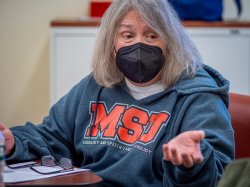
Support and encouragement were on full display during the book club session.
“My brain doesn’t work anymore,” Dave says at one point.
“Your brain works,” Amelia tells him. “You had a stroke.”
“A stroke. Yeah…I have to get better,” he replies.
“Dave, I think you’re doing a great job,” Amelia reassures him. “I really think you’re doing a great job.”
“I agree,” McArthur adds. “You’re doing great. Look how far you’ve come.”
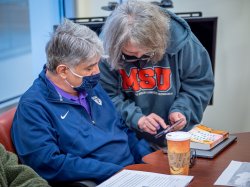
Dave explains to a visitor: “I had a stroke. Seven years ago…I couldn’t talk…They [speech language therapists and students] helped me…I couldn’t say anything.”
Despite repeated mentions of his stroke and talk of how he misses publishing – or “what I used to be,” as he sometimes put it – it’s also clear that Dave relishes being the class clown.
At one point, he talks about how strokes affect people differently. “Whatever you have is a stroke. That’s why we have people like Diane. She helps us a lot. I don’t really know…but I’m supposed to say that,” he says, prompting laughter from the group.
That assistance, as well as the encouragement and friendships, are what keep the members coming back.
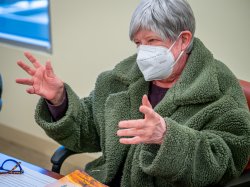
“We’ve been together a long time,” says Kim, who lives in Glen Ridge and has apraxia, which makes speaking difficult because of a disconnect between the brain and body movements, such as lips, tongue, jaw and limbs. “I was comforted by people with similar disorders. I felt comfortable among them. This was very important.”
Dave sums it up this way: “I come there to be happy…” Then teasing Amelia and Kim, he adds, “And I’m not sure I like these two guys.”
The group erupts in laughter yet again. He laughs, adding: “No, I really have…become friends…with lots of names. It’s just great. I love what I have. I love them everywhere.”
Amelia adds, “I feel if I could get an inch better, that’s why I come here all the time. Kim said it all. It’s the comfort that we get because we’re not…We can speak but, you know, it’s hard sometimes…We can make mistakes, and we could say things wrong, and we all know that. We all know that.”
Dave chimes in: “They taught me…how to read…just like I was a kid once again.”
Pointing to Amelia, he says, “She helped me…I wasn’t good at what I used to do. They told me how. They told me how. She told me how.”
Amelia replies: “Oh, I could cry now. Come on, Dave, oh my goodness!”
Story by Staff Writer Sylvia A. Martinez. Photos by University Photographer Mike Peters.
